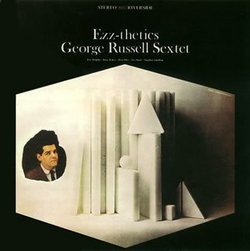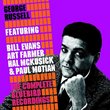| All Artists: George Russell Title: Ezz - Thetics (Shm) Members Wishing: 0 Total Copies: 0 Label: Universal Japan Release Date: 8/20/2008 Album Type: Original recording remastered, Import Genres: Jazz, Pop Styles: Avant Garde & Free Jazz, Modern Postbebop, Bebop Number of Discs: 1 SwapaCD Credits: 1 |
Search - George Russell :: Ezz - Thetics (Shm)
 | George Russell Ezz - Thetics (Shm) Genres: Jazz, Pop
Japanese only remastered SHM-CD (Super High Material CD - playable on all CD players) pressing includes 2 bonus tracks. Universal. 2008. |
Larger Image |
CD DetailsSynopsis
Album Description Japanese only remastered SHM-CD (Super High Material CD - playable on all CD players) pressing includes 2 bonus tracks. Universal. 2008. Similar CDs
|
CD ReviewsA classic date N. Dorward | Toronto, ON Canada | 11/08/2000 (5 out of 5 stars) "For this Riverside date, George Russell assembled one of the most formidable lineups of the early 1960s--Eric Dolphy on sax and bass clarinet, Don Ellis on trumpet, David Baker on trombone, a youthful Steve Swallow on bass, and the fine & now forgotten Joe Hunt on drums. Russell had by this time moved (rather in the manner of Gil Evans) from the almost bewilderingly dense arrangements & compositions of his early work ("Lydian M-1", "All About Rosie", the Workshop disc, &c.) to a more openended approach. While "Thoughts" is a stunning close-knit arrangement, the rest of the pieces place more stress on improvisation within traditional jazz structures. "Honesty" is one highlight: it's a blues piece (by Baker) that splits each solo between a completely free section & a climactic old-time blues solo. Fine stuff. "Round Midnight" is a beautifully crafted showcase for Eric Dolphy, who leaps out of the quiet and eerie opening to deliver one of his most notable performances. "Ezz-Thetic" and "Lydiot" are angular, unpredictable themes that spur all the soloists on. "Nardis" is given a very individual colouring, taken at a much slower pace than I've heard anyone else play it.This is one of Russell's most successful recordings; it is a great pity he never recorded again with Dolphy, in particular, as the altoist's grasp of the music is palpable. Russell was always skilled at constructing arrangements around musicians, rather than vice versa, like Ellington before him; he'd worked similar magic with Bill Evans before & with Sheila Jordan later. Don Ellis was to contribute to Russell's next few Riverside albums, however: his highly individual & expressive playing here & on albums like _The Outer View_ is a pleasure to hear. _Ezz-Thetics_ remains a landmark in postwar jazz: while it's less well-known than _Blues and the Abstract Truth_ or Gil Evans' work with Miles Davis, it deserves to be mentioned in the same breath as them." Jazz theorist composes ravishing music Ricard Giner (cootie@cootiesjazz.co | Brighton, UK | 06/03/2001 (5 out of 5 stars) "Jazz has produced few theorists among its practitioners. George Russell wrote an influential book, The Lydian Chromatic Concept of Tonal Organization (1953, out of print), that was to become the reference point for the modal experiments of Miles Davis. It was an attempt to argue that the theoretical framework of jazz was sui generis. It constructed a theory around the diatonic progression from F to F on the white keys of the piano.Ezz-thetics stands out among Russell's early recordings for the presence of Eric Dolphy and of the underrated Dave Baker. Baker's dizzying solo on the opening "Ezz-thetic" should have made trombonists of the time look beyond the post-bop clichés that they were too often resorting to.Eric Dolphy is heard here on sparkling form, brimming with hypnotic power. "Ezz-thetic" provides a polytonal background that is ideal for Dolphy's exploration of the inner space of the harmonies. Dolphy is often regarded as a major exponent of "out" playing - he used the word in three of his album titles - taking the harmonies of a theme beyond their implied natural parameters. But this characterisation fails to account for his phenomenal ability to open up the inner attributes of chord or scale progressions in concentrated bursts of slurred scales and arpeggios.This is particularly evident in his playing on "'Round Midnight", which here gets an unusual, simultaneously frenzied and languid treatment. It didn't appear on the original release, and its welcome addition to the current CD rounds off a session that marks a fascinating inflection in the direction that jazz was experiencing in the early 1960s.Steve Swallow, who at the age of 20 had appeared on just two records for Jimmy Giuffre and one for Don Ellis earlier that year, provides a soft swinging groove to Russell's piano on "Lydiot", a kind of self-penned pun on Russell's own theory. "Honesty" is remarkable for starting like an ending. It makes ironic use of solemn changing tempos to suggest the end of a rather formal composition, only to reveal that this mock "finale" was in fact an introduction.George Russell's Ezz-thetics is a complete stand-alone classic." "To innovate" is a privilege of the fews Jazzcat | Genoa, Italy Italy | 09/06/2004 (5 out of 5 stars) "Few albums are able to stand out still among the hundreds of fantastic jazz gems that fifties and sixties produced. This one surely can be considered as one of the best attempts to create something new but still inside the jazz tradition, the swing pulsation. This is not free, this is not third stream neither it is a conventional blowin' session. It's something else. It is an album that stands in a aesthetic category of its own. It is great jazz first of all, something that a lot of free albums are not. It has some meaningful experiments, something you can't say of a lot of third stream albums which are for the most part meaningless. It has respect for the jazz forms but it is not a conventional album, it's adventurous. It's different, it's strange, it's "hard" jazz but it has pure melodies .. it may sound a little similar to some Mingus music and to some Monk music but it is a successful original mix of these guys's music ... it's different. It's a bebop-avantgarde album .. yes this is the way I might call it .. It is really interesting and it surely has great musical value. And yes it can catch you forever with just a single listening session. But I would not call it "an awesome introductory CD for all jazz listeners" .. because it's not that simple. But it is really powerful! Russell has a kind of monkish approach to piano solos, he plays essential, not flashy but still very interesting. Dolphy is in marvellous shape like Don Ellis which I didn't know about prior to this album. Dont' be fooled by other reviewers. Even if it's a modal kind of album it's not similar to "Kind of blue" which is a lot more simpler (it has at least a couple of simple blues tunes in it), and it is neither similar to "A love supreme" which cannot stand "Ezz thetics" musical value and complexity. "Bitches brew" it's still something else, an electric trip in a new music not linked to Jazz forms where "Ezz thetic" instead swings hard! I repeat "Ezz thetics" is something really fantastic and different. A new powerful and original Jazz Ezzthetic. Russel has been one of the "fews" I was talking about."
|

 Track Listings (6) - Disc #1
Track Listings (6) - Disc #1
